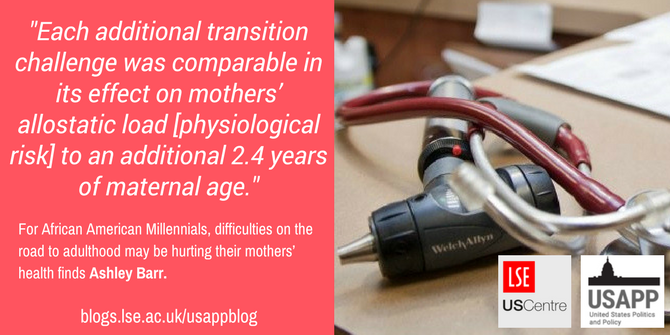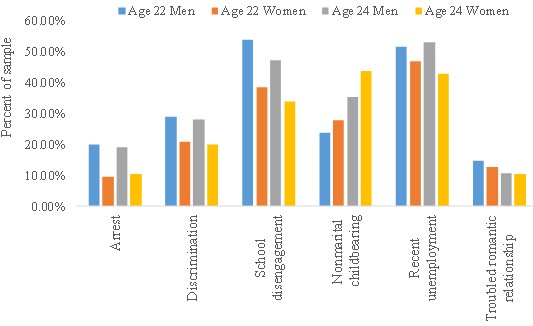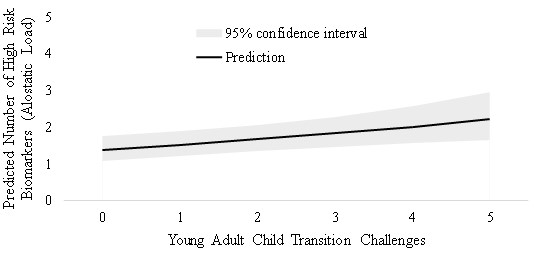 Exposure to constant stress has a proven to be bad for people’s health. But what is the effect of stress that comes from family relationships, such as when parents have to support their children’s path to adulthood? In new research, Ashley Barr studies the effects of this kind of stress on mothers’ health, finding that young African Americans’ challenges during the transition to adulthood are closely linked to their mothers having poorer health. Each additional challenge faced by African American adolescents, such as economic hardship or racial discrimination, prematurely ages their mothers by nearly two and a half years.
Exposure to constant stress has a proven to be bad for people’s health. But what is the effect of stress that comes from family relationships, such as when parents have to support their children’s path to adulthood? In new research, Ashley Barr studies the effects of this kind of stress on mothers’ health, finding that young African Americans’ challenges during the transition to adulthood are closely linked to their mothers having poorer health. Each additional challenge faced by African American adolescents, such as economic hardship or racial discrimination, prematurely ages their mothers by nearly two and a half years.
As implied by the familiar warning not to “worry yourself sick,” most of us understand that conditions which cause stress, particularly when they are chronic or sustained, can impair our mental and physical health. This common understanding is backed up by research linking a variety of these stressors, including relationship discord, economic hardship, and racial discrimination, to the physiological changes that increase risk for chronic disease and early death. Despite the vast literature documenting the detrimental effects of chronic stressors, the importance of network stressors, or those experienced by family members or loved ones, has not been fully integrated into our understanding of the link between stress and health. In new research, my colleagues and I find that expanding our understanding of health-deteriorating stressors to include those that are common across relationships—like that between parents and their young adult children— may give us additional insight into the role of stress in healthy aging and the mechanisms driving health inequalities.
The transition to adulthood as a network stressor
Much attention has been paid to the latest crop of young people transitioning to adulthood. Now in their late 20s and 30s, members of the so-called Millennial generation are expected to be completing their education, making headway in the workforce, establishing independent households, and building stable families. Many, however, particularly racial minorities and those from low social class backgrounds, are struggling to do so. We know that barriers and missteps on the road to adulthood often signal continued struggles across the remainder of the life course. We often fail to consider, however, what challenges for young people mean for their aging parents, who, in the United States, are often tasked with shepherding their children to independence with little public support.

“Week #35/52” by Connor Tarter is licensed under CC BY SA 2.0
In Finland, for example, publicly-funded housing support and assistance in pursuing education, vocational training, and a career help to usher young people into stable adult roles. Young people in the US, however, lack such institutional guidance and a generous social welfare regime and are left to rely mostly on private supports during the transition to adulthood. Parents often serve as safety nets and scaffolds as young people navigate this transition. Given high levels of racial and economic inequality in the US, this reliance often means that the heaviest burden of support falls on those parents least equipped to help their children establish a firm footing. Historical and contemporary structures of economic and racial marginalization, for instance, render the transition to stable adult roles particularly challenging for African Americans, while simultaneously limiting the cultural, social, and economic capital of their parents.
Linking young adult children’s stressors to mothers’ health
In our research, we asked what challenges experienced by African Americans during the transition to adulthood mean for the health of their middle-aged mothers. Using data from several hundred pairs of mothers and their young adult children (born around 1986), we examined six different challenges spanning salient domains during the transition to adulthood: unemployment, unmarried parenthood, arrest, romantic relationship difficulties, racial discrimination, and educational disengagement. We asked young people at age 22 and again at age 24 to report on their experiences across these domains and then summed the number of challenges to create a measure of overall difficulty at this stage in the life course. Not surprisingly, the vast majority (87 percent) of young African Americans experienced one or more of these challenges at each age (average at age 22 = 1.72; average at age 24 = 1.77). Figure 1 shows the distribution of each challenge by gender. As this figure indicates, these challenges are relatively common for both African American men and women, but young men were significantly more likely than young women to experience a recent arrest, high levels of racial discrimination, school disengagement, and unemployment at one or both ages.
Figure 1 – Frequency of transition challenges by gender and age

Our primary measure of mothers’ health risk was allostatic load, an indicator of cumulative wear and tear on the body and overall physiological risk. We assessed allostatic load using six indicators that spanned the cardiovascular (body mass index and systolic and diastolic blood pressure), metabolic (HbAlc), and immune (C-reactive protein and Soluble IL-6 receptor) systems. Consistent with research documenting the health toll of racism, nearly ¾ of mothers in our sample were high risk on at least one of these allostatic load biomarkers.
As shown in Figure 2, young African Americans’ challenges during the transition to adulthood were positively and significantly associated with mother’s allostatic load. Importantly, this effect occurred above and beyond multiple selection factors that could increase the odds of young people experiencing a difficult transition to adulthood and impair maternal health (e.g. economic hardship, neighborhood disorder, children’s difficulties during adolescence, family structure, prior health of mother and child). Each additional transition challenge was comparable in its effect on mothers’ allostatic load to an additional 2.4 years of maternal age. We found similar effects when we tested our hypotheses using subjective health outcomes (self-rated health and psychological distress) over time.
Figure 2 – Mothers’ predicted allostatic load by young adult child transition challenges

Note: Predictions estimated holding all other variables at sample mean
We also found that the effect of young adult children’s transition challenges on maternal health risk was stronger for male young adult children and for those who experienced difficulties at slightly older ages during the transition to adulthood. These gender and age differences, however, were found only in the allostatic load models. The subjective health models showed no differences in effects by young adult gender or age.
What do we make of these findings?
Our findings highlight the network consequences of a challenging transition to adulthood for African Americans, as these consequences appear to proliferate beyond young people to the health of their mothers. These broader consequences must be considered when debating the availability of public supports for young people on the road to adulthood. Increased supports designed to prevent these challenges (e.g. educational assistance, criminal justice reform) or those designed to mitigate their effects (e.g. enhanced safety nets) may be beneficial on multiple fronts, improving the life chances of struggling young adults, enhancing healthy aging among their parents, and reducing racial and economic health inequalities among both generations.
- This article is based on the paper “Sharing the Burden of the Transition to Adulthood: African American Young Adults’ Transition Challenges and Their Mothers’ Health Risk” in the American Sociological Review.
Please read our comments policy before commenting
Note: This article gives the views of the author, and not the position of USAPP– American Politics and Policy, nor of the London School of Economics.
Shortened URL for this post: http://bit.ly/2JPsh7V
About the author
 Ashley Barr – State University of New York at Buffalo
Ashley Barr – State University of New York at Buffalo
Ashley Barr is an Assistant Professor of Sociology at the State University of New York at Buffalo. Her research focuses on the social foundations of health and well-being, particularly the role of romantic and family relationships in promoting or impairing health.



